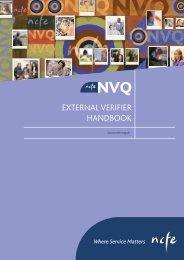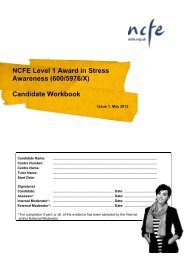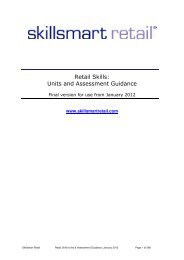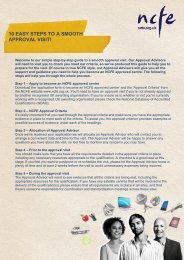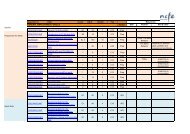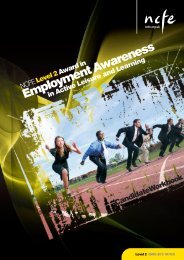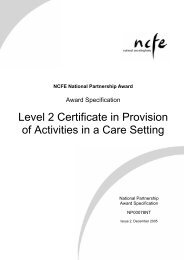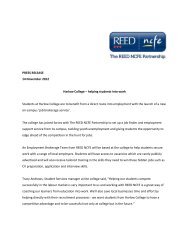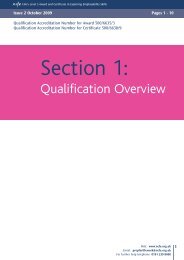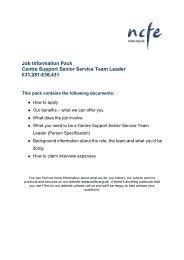Evidence Tracking Sheet - NCFE
Evidence Tracking Sheet - NCFE
Evidence Tracking Sheet - NCFE
You also want an ePaper? Increase the reach of your titles
YUMPU automatically turns print PDFs into web optimized ePapers that Google loves.
<strong>NCFE</strong> Level 3 NVQ Certificate in Advice and<br />
Guidance (600/0136/7)<br />
<strong>Evidence</strong> <strong>Tracking</strong> <strong>Sheet</strong><br />
Learner name:
<strong>NCFE</strong> Level 3 NVQ Certificate in Advice and Guidance (600/0136/7)<br />
<strong>Evidence</strong> <strong>Tracking</strong> <strong>Sheet</strong>s<br />
<strong>Tracking</strong> your evidence<br />
During your course your Assessor will ask you to carry out work either in the classroom, in your workplace or at home which you’ll keep as<br />
evidence of your learning.<br />
The work you produce (evidence) will be assessed by your Assessor to make sure you’ve covered everything in sufficient detail. Your<br />
evidence could be made up of a combination of:<br />
♦ written work or class notes<br />
♦ products or samples of practical work<br />
♦ case studies<br />
♦ simulated activities or role play<br />
♦ work placement diaries<br />
♦ learning logs<br />
♦ video or audio recordings<br />
♦ other appropriate formats suggested by your Assessor<br />
When all of your evidence is gathered together in a file or folder, this becomes your portfolio.<br />
Your centre and Assessor may have systems that they use to plan and monitor your assessment. These may be computer-based (eg using ‘eportfolio’<br />
software) or paper-based (using forms or checklists). These systems are designed to show how each piece of evidence meets which<br />
learning outcomes and assessment criteria.<br />
How your evidence is checked<br />
After your Assessor has assessed your work, another member of staff - the Internal Moderator/Verifier - will review it. An External<br />
Moderator/Verifier from <strong>NCFE</strong> will visit your centre. The External Moderator’s/Verifier’s role is to make sure your work has been assessed to<br />
<strong>NCFE</strong>’s requirements. They’ll do this by checking a sample of candidates’ portfolios – which may include yours. They also may wish to talk to<br />
you about the content of the course and the work you’re doing.<br />
How you get your certificate<br />
Once you’ve built up your portfolio and your Assessor and the Internal and External Moderators/Verifiers are satisfied it meets the standards,<br />
you’ll be awarded the <strong>NCFE</strong> Level 3 NVQ Certificate in Advice and Guidance (600/0136/7).<br />
2
<strong>NCFE</strong> Level 3 NVQ Certificate in Advice and Guidance (600/0136/7)<br />
<strong>Evidence</strong> <strong>Tracking</strong> <strong>Sheet</strong>s<br />
Example<br />
(M/102/4501) Prepare yourself to deliver good customer service<br />
Learning outcomes<br />
In this column, write down what evidence you<br />
have put in your portfolio. For example letter to<br />
client, report, witness testimony, emails etc.<br />
<strong>Evidence</strong><br />
When you prepare yourself to deliver good customer service you must consistently:<br />
Describe the customer service of your organisation to customers and/or colleagues<br />
1. explain what your organisation does and presentation<br />
the type of customers it has<br />
2. describe who’s who and who does what to presentation<br />
provide customer service<br />
3. describe who to go to for information or presentation<br />
help when dealing with customer service<br />
issues<br />
Describe your organisation’s products or services to customers and/or colleagues<br />
1. list your organisation’s services or<br />
report<br />
products<br />
2. answer simple customer questions about Witness testimony<br />
your organisation’s products or services<br />
3. explain why good customer service is report<br />
important for your organisation<br />
4. explain the effects of providing poor report<br />
customer service<br />
Location<br />
saved in G/Drive on computer<br />
saved in G/Drive on computer<br />
saved in G/Drive on computer<br />
page 15 of portfolio<br />
saved in file<br />
page 15 of portfolio<br />
page 15 of portfolio<br />
The assessment criteria<br />
are listed in this column.<br />
In this column, write the location of the evidence<br />
within your portfolio. This directs your Assessor<br />
to the correct piece of evidence. Examples of the<br />
location could be a page number in a portfolio, a<br />
file name saved on your computer etc.<br />
3
<strong>NCFE</strong> Level 3 NVQ Certificate in Advice and Guidance (600/0136/7)<br />
<strong>Evidence</strong> <strong>Tracking</strong> <strong>Sheet</strong>s<br />
(J/602/5138) Establish communication with clients for advice and guidance<br />
Learning outcomes<br />
Type of evidence<br />
You must be able to:<br />
Understand the factors that contribute to effective communication with clients<br />
1.1 Explain how to create a safe and<br />
suitable environment for practitioners<br />
and clients<br />
Location<br />
1.2 Explain the effects of different types of<br />
verbal and non-verbal communication<br />
Establish effective communication with clients<br />
2.1 Introduce the service to clients in a<br />
way that matches their needs<br />
2.2 Provide clients with the appropriate<br />
time to express their requirements<br />
2.3 Make the client aware of limits of<br />
confidentiality<br />
4
<strong>NCFE</strong> Level 3 NVQ Certificate in Advice and Guidance (600/0136/7)<br />
<strong>Evidence</strong> <strong>Tracking</strong> <strong>Sheet</strong>s<br />
Understand how to minimise difficulties when communicating with clients<br />
3.1 Explain what difficulties with, and<br />
barriers to, communication may occur<br />
3.2 Explain immediate actions to minimise<br />
any difficulties with, and barriers to,<br />
communication<br />
3.3 Explain how to access support for<br />
minimising difficulties with, and<br />
barriers to, communication<br />
Minimise difficulties in communication<br />
4.1 Identify communication difficulties in<br />
relation to individual clients<br />
4.2 Adapt own approach to minimise the<br />
effect of any communication difficulties<br />
4.3 Select resources to meet the needs of<br />
individual clients<br />
5
<strong>NCFE</strong> Level 3 NVQ Certificate in Advice and Guidance (600/0136/7)<br />
<strong>Evidence</strong> <strong>Tracking</strong> <strong>Sheet</strong>s<br />
(Y/602/5192) Review own contribution to the service<br />
Learning outcomes<br />
Type of evidence<br />
You must be able to:<br />
Assess own contribution to the work of the service<br />
1.1 Assess own work against specified<br />
objectives<br />
Location<br />
1.2 Review feedback on own work<br />
1.3 Review the priorities assigned to work<br />
objectives<br />
Develop to achieve work objectives<br />
2.1 Identify realistic development<br />
objectives<br />
2.2 Agree a personal development plan<br />
with the appropriate people<br />
6
<strong>NCFE</strong> Level 3 NVQ Certificate in Advice and Guidance (600/0136/7)<br />
<strong>Evidence</strong> <strong>Tracking</strong> <strong>Sheet</strong>s<br />
You must be able to:<br />
2.3 Identify and make use of suitable<br />
development opportunities<br />
Type of evidence<br />
Location<br />
2.4 Review and update personal<br />
development plans regularly, taking<br />
account of any changes in work<br />
requirements<br />
2.5 Explain why the items in the plan will<br />
aid development and maintain and<br />
update relevant knowledge<br />
7
<strong>NCFE</strong> Level 3 NVQ Certificate in Advice and Guidance (600/0136/7)<br />
<strong>Evidence</strong> <strong>Tracking</strong> <strong>Sheet</strong>s<br />
(L/602/5139) Support clients to make use of the advice and guidance service<br />
Learning outcomes<br />
Type of evidence<br />
You must be able to:<br />
Enable clients to decide whether to use the service<br />
1.1 Encourage clients to clarify their<br />
requirements and circumstances<br />
Location<br />
1.2 Assist clients to decide whether the<br />
service can meet their requirements,<br />
including:<br />
• Identifying the appropriate<br />
information<br />
• providing clients with information on<br />
the advantages and disadvantages<br />
of using the service<br />
Identify and provide accurate information required by clients<br />
2.1 Explore with clients the reasons for<br />
their information needs and agree how<br />
it will be provided<br />
2.2 Identify the most appropriate<br />
information sources and retrieve the<br />
relevant information<br />
8
<strong>NCFE</strong> Level 3 NVQ Certificate in Advice and Guidance (600/0136/7)<br />
<strong>Evidence</strong> <strong>Tracking</strong> <strong>Sheet</strong>s<br />
You must be able to:<br />
2.3 Check the clients understanding of the<br />
information and confirm that the<br />
information provided is sufficient for<br />
their requirements<br />
2.4 Agree with the client any further<br />
activities necessary, including referral<br />
to alternative sources of information<br />
Type of evidence<br />
Location<br />
Understand the services provided by other suitable services<br />
3.1 Explain what other suitable services<br />
are available<br />
3.2 Explain what is offered by these other<br />
services<br />
Provide information on other suitable services<br />
4.1 Provide information on other services<br />
that may be more suitable for meeting<br />
the clients requirements<br />
4.2 Advise the client on the approach to<br />
other services<br />
9
<strong>NCFE</strong> Level 3 NVQ Certificate in Advice and Guidance (600/0136/7)<br />
<strong>Evidence</strong> <strong>Tracking</strong> <strong>Sheet</strong>s<br />
You must be able to:<br />
Agree with clients their use of the service<br />
5.1 Clarify and confirm the clients’<br />
requirements and how these will be<br />
met by the service<br />
5.2 Agree the way in which services can<br />
be provided<br />
Type of evidence<br />
Location<br />
5.3 Advise the client of the procedures for<br />
contacting and using the service<br />
10
<strong>NCFE</strong> Level 3 NVQ Certificate in Advice and Guidance (600/0136/7)<br />
<strong>Evidence</strong> <strong>Tracking</strong> <strong>Sheet</strong>s<br />
(R/602/5210) Understand the importance of legislation and procedures<br />
Learning outcomes<br />
Type of evidence<br />
You must be able to:<br />
Understand legislation and codes of practice which impact on your role<br />
1.1 Explain the current, national, local,<br />
professional and organisational<br />
requirements that relate to your role<br />
including:<br />
• Equal opportunities<br />
• Discrimination<br />
• Health and safety<br />
• Security<br />
• Confidentiality<br />
Location<br />
1.2 Explain the importance of complying<br />
with national, local, professional and<br />
organisational requirements<br />
1.3 Explain the consequences of<br />
non-compliance<br />
11
<strong>NCFE</strong> Level 3 NVQ Certificate in Advice and Guidance (600/0136/7)<br />
<strong>Evidence</strong> <strong>Tracking</strong> <strong>Sheet</strong>s<br />
You must be able to:<br />
Understand how to deal with urgent situations<br />
2.1 Explain what types of situation that<br />
may occur that require immediate<br />
action<br />
2.2 Explain what actions should be taken<br />
to deal with different situations<br />
Type of evidence<br />
Location<br />
2.3 Explain who can be referred to for<br />
assistance in situations where<br />
immediate action is required<br />
Record contacts, interactions, agreements, and provision of information<br />
3.1 Record contacts, interactions,<br />
agreements and information provided<br />
in the appropriate systems<br />
3.2 Explain what systems are used for<br />
recording these interactions<br />
3.3 Explain why it is important to use<br />
these systems<br />
12
<strong>NCFE</strong> Level 3 NVQ Certificate in Advice and Guidance (600/0136/7)<br />
<strong>Evidence</strong> <strong>Tracking</strong> <strong>Sheet</strong>s<br />
You must be able to:<br />
3.4 Describe any procedures relating to<br />
the use of these systems<br />
Type of evidence<br />
Location<br />
Understand the actual or potential effect of own values, beliefs, attitudes and behaviours when working<br />
4.1 Explain the actual or potential effect of<br />
own values, beliefs, attitudes and<br />
behaviours when working<br />
Understand why the effectiveness of methods may vary depending upon the situation and clients involved<br />
5.1 Explain how to assess the<br />
effectiveness of methods<br />
5.2 Explain why the effectiveness of<br />
methods may vary with different<br />
clients<br />
5.3 Explain the types of issue that might<br />
arise<br />
5.4 Explain the actions that may be taken<br />
to address these issues<br />
5.5 Explain the implications of not<br />
addressing these issues<br />
13
<strong>NCFE</strong> Level 3 NVQ Certificate in Advice and Guidance (600/0136/7)<br />
<strong>Evidence</strong> <strong>Tracking</strong> <strong>Sheet</strong>s<br />
About <strong>NCFE</strong><br />
Enquiries<br />
Any enquiries relating to this qualification should be addressed to:<br />
<strong>NCFE</strong><br />
Citygate<br />
St James Boulevard<br />
Newcastle upon Tyne<br />
NE1 4JE<br />
Tel: 0191 239 8000<br />
Fax: 0191 239 8001<br />
E-mail: care@ncfe.org.uk<br />
Website: www.ncfe.org.uk<br />
Equal Opportunities<br />
<strong>NCFE</strong> fully supports the principle of equal opportunities and opposes all unlawful or unfair discrimination on the grounds of ability, age, colour,<br />
culture, disability, domestic circumstances, employment status, gender, marital status, nationality, political orientation, racial origin, religious<br />
beliefs, sexual orientation and social background.<br />
<strong>NCFE</strong> aims to ensure that equality of opportunity is promoted and that unlawful or unfair discrimination, whether direct or indirect, is eliminated<br />
both in its own employment practices, and in access to its qualifications.<br />
You can download a copy of <strong>NCFE</strong>’s Equal Opportunities Policy from www.ncfe.org.uk.<br />
Data Protection<br />
<strong>NCFE</strong> is registered under the Data Protection Act and committed to maintaining the highest possible standards when handling personal<br />
information.<br />
<strong>NCFE</strong> is a registered charity (Registered Charity No. 1034808) and a company limited by guarantee (Company No. 2896700).<br />
All the material in this publication is copyright. © <strong>NCFE</strong> Issue 1, January 2011<br />
All information contained in this publication is correct at the time of printing.<br />
14




